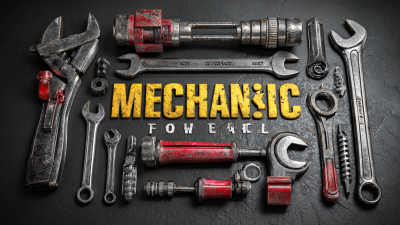In today's rapidly evolving digital landscape, choosing the right tools website is crucial for businesses aiming to enhance productivity and streamline operations. According to a recent report by McKinsey, companies that leverage digital tools effectively can boost their performance by up to 20-25%. Furthermore, a survey conducted by Gartner indicates that nearly 70% of organizations plan to increase their investment in digital tools over the next few years.

As businesses increasingly rely on technology to manage workflows, customer relationships, and data analytics, identifying the best tools website tailored to specific needs becomes imperative. This guide will provide insights into evaluating available options, ensuring that you select a platform that not only meets current demands but also supports future growth.
When selecting the best tools for your business, it's crucial to identify your specific requirements and goals. Start by evaluating both your short-term and long-term objectives. Consider factors such as the size of your target market, potential sales price, logistics costs, and currency stability. A clear understanding of these aspects will help you streamline your selection process and ensure that the tools you choose align with your strategic vision.

Additionally, it's essential to analyze the competitive landscape and market trends. Utilize data-driven insights to assess the demand for various products in different regions. This will equip you with the information needed to make informed decisions about which tools can enhance efficiency and drive profitability. As AI technologies and innovative methodologies become more prevalent, leveraging these tools can provide significant advantages in optimizing your operations and meeting consumer needs effectively.
Choosing the right tools for your business demands a thorough understanding of industry-specific solutions and their market adoption rates. Different sectors often require specialized tools to effectively meet their unique challenges and enhance operational efficiency. For instance, the healthcare industry heavily relies on electronic health records (EHR) systems, while the retail sector benefits from point-of-sale (POS) software that integrates seamlessly with inventory management. Assessing how widely these tools are adopted within your industry can provide valuable insights into their effectiveness and reliability.
Additionally, examining the market adoption rates of various tools can help identify trends and potential gaps in service. Tools with a high adoption rate are often accompanied by a robust user community and extensive support resources, making it easier for businesses to implement them. However, emerging tools with lower adoption rates might offer innovative features that could present untapped opportunities. Evaluating both popular and niche tools allows business owners to make informed decisions that align with their strategic goals, ensuring that they invest wisely in solutions that cater specifically to their operational needs.

When choosing the best tools website for your business, evaluating user experience and customer support is crucial. A website that is intuitive and easy to navigate can significantly enhance productivity and satisfaction for your team. Look for platforms that offer streamlined interfaces, clear categorization of tools, and useful search features. User experience plays a vital role in ensuring that your team can quickly access the resources they need without unnecessary frustration or confusion.
In addition to user experience, robust customer support is essential for resolving issues efficiently and maintaining operational continuity. Investigate the support options available on different platforms, such as live chat, email assistance, and comprehensive knowledge bases. Reading reviews and testimonials can provide insights into how responsive a company's support team is and how effectively they address user concerns. A reliable support system can make a considerable difference, especially during critical moments when your business relies on these tools for success.
When selecting the best tools website for your business needs, scalability and integration capabilities with existing systems are two critical factors to consider. Scalability ensures that the tools can adapt to your business's growing demands, allowing you to expand operations without facing significant limitations. A scalable tool can handle increased loads and more complex operations as your business evolves, contributing to operational efficiency in both the short and long term.
Integration capabilities are equally important, as they determine how seamlessly new tools will work with your existing systems. A website that offers robust integration options allows for a smoother transition and minimizes disruptions. Look for tools that provide APIs and connectors to your current software, ensuring data flows easily between systems. This compatibility not only streamlines processes but also enhances productivity by reducing the time spent on manual data transfers and decreasing the risk of errors. Evaluating both scalability and integration will ultimately help you choose a tools website that supports your business’s growth and operational consistency.
When selecting the best tools website for your business,
a comprehensive cost-benefit analysis is essential. According to a recent report by Forrester, businesses that conduct thorough evaluations on tool efficiency can realize up to a 30% increase in productivity. This assessment considers factors such as initial costs, ongoing expenses, and potential savings generated by utilizing the right tools. For instance, a company investing in project management software may incur an initial cost but, as per a PMI study, can see a project success rate increase by up to 87% when tools are implemented effectively.
Additionally, leveraging industry standards for comparative analysis can significantly streamline your decision-making process. According to Gartner, 60% of companies that utilize benchmarking approaches report improved financial performance. By examining tools based on established metrics such as user satisfaction, integration capabilities, and return on investment, businesses are better positioned to align their tool selection with their strategic goals. Ultimately, aligning these evaluations with your specific business needs will ensure a more effective investment in the right technological solutions.






Contact
KYOCERA SGS Precision Tools, Inc.
(330) 686-5700
150 Marc Drive
Cuyahoga Falls, OH 44223
Products
Resources